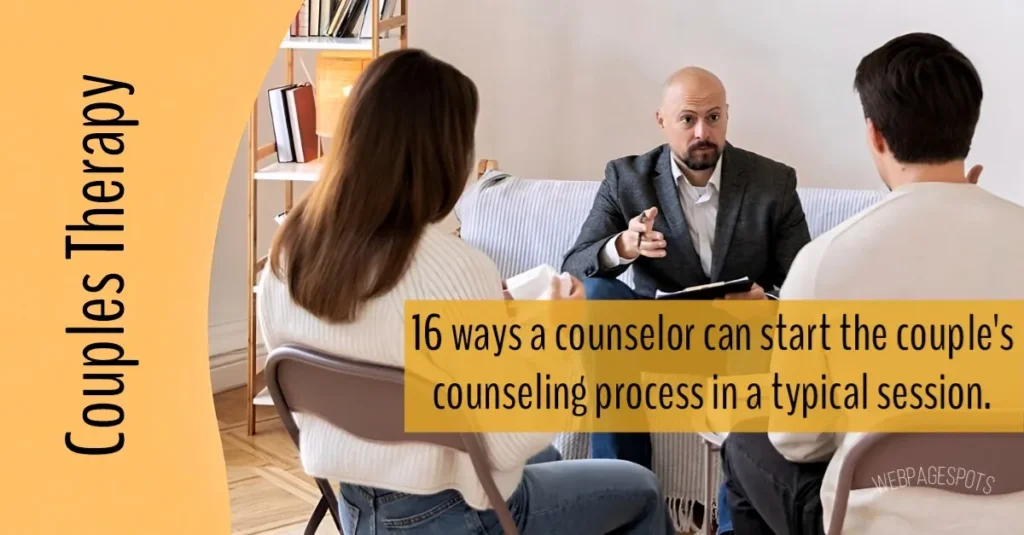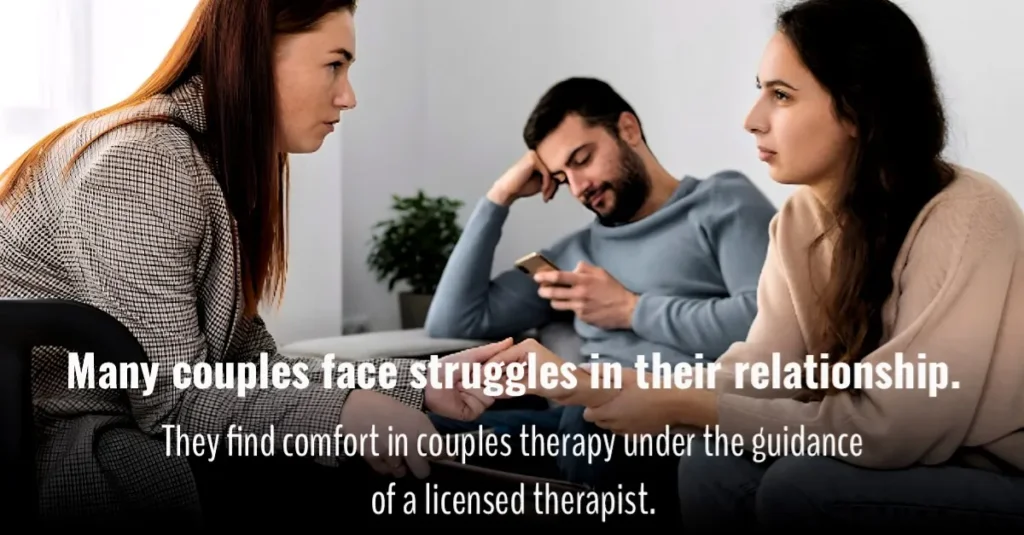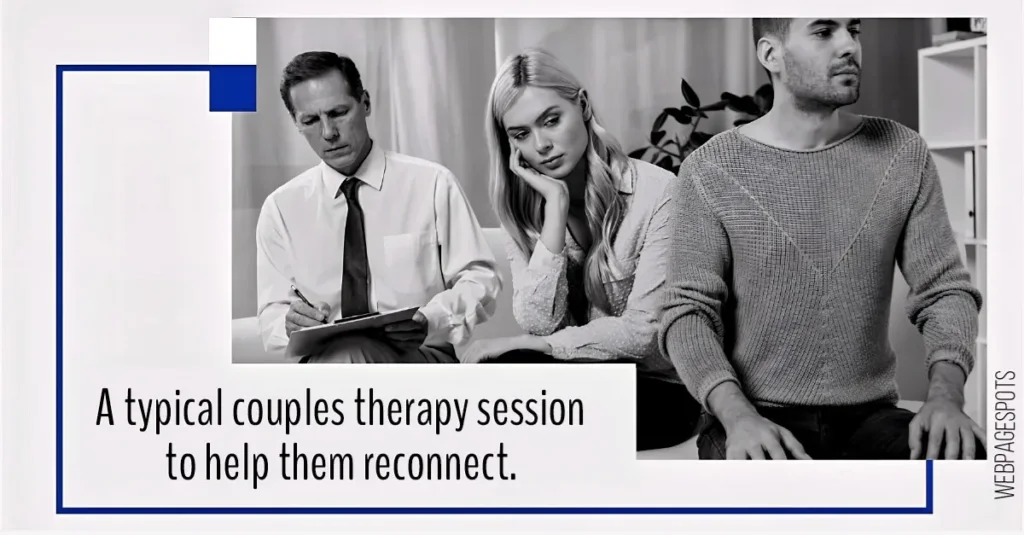16 dynamic ways to outline a couples therapy session to help you reconnect.
This blog post may contain affiliate links. If we find a product or service to be useful, we encourage you to visit the website via that link. If you make a purchase through our referral link, we may receive a commission. Rest assured, you will not be charged any additional fees. By using these links, you can support us while making your purchase. For more information visit here.
A few years ago, a woman said she pictured marriage like two astronauts floating around in space tethered together. This analogy of two people fumbling with ropes in zero gravity, trying to sync up, is a fitting way to describe a relationship. To help with this process, couples therapy can be a worthwhile resource for strengthening relationships and providing ongoing support.
Most individuals who are in the process of isolation or divorce often overlook one thing, which is couples therapy. The couple must seek marriage counseling once during the separation process. A couples therapy session can help you grow in your relationship by bringing attention to the issues you have been having. But couples are all unique, which is why one type of therapy won’t work for all couples.
There are many goals that a couple might have before entering therapy, but all relationship counseling sessions have some basic frameworks. Thus, it’ll be helpful for couples who attend therapy sessions to know what will happen there in advance. This article will explore 16 ways a counselor can outline a couples therapy session and help them reconnect. The following blog will also help anyone get started!
How to reconnect with your partner in couples therapy sessions?
Couples therapy may be the answer if you feel disconnected from your partner. This article explores a typical couples therapy session and how it can help reconnect you with your partner.
Couples therapy sessions allow the counselor to help each spouse understand the other’s perspective and ultimately reconnect. In the sessions, a mentor looks at potential solutions to inside & outside problems causing conflict within their relationship.
What happens in a typical session?
In most cases, couples therapy involves sitting with a therapist and discussing your problems. The therapist will provide guidance and help you find solutions to these problems. Often, they (he/she) will ask each person to complete individual homework assignments outside of the sessions to further progress the healing process.
Why does it work?
Couples therapy works because it gives you a safe space to communicate openly and honestly. It also allows you to see things from your partner’s perspective, which can help break down barriers between you. Finally, by working on your relationship with a professional therapist, you are giving yourselves the maximum chance of success.

16 Ways a counselor outlines a couples therapy session.
Whether your marriage is suffering from a lack of jealousy or communication, there are ways to help your marriage get back on track. Couples counseling is all about the two people in the relationship. This is the reason many couples see a therapist or counselor together.
The first thing that a therapist will do is get both partners to talk about their pain. This is especially helpful for people who are in the early stages. Here are 16 ways a counselor may follow in a couples therapy session to help the two people in the relationship reconnect.
1. Find out the reasons for their unhappiness and what they want to achieve from therapy.
When a couple comes into therapy, the counselor will spend some time exploring why the couple is seeking therapy. What are the specific issues that they are hoping to address? What are their goals for therapy? After getting a sense of what the couple wants to achieve, the counselor will then explore the couple’s history and relationship.
This will help the counselor understand how the couple interacts and what may contribute to the current problems. Once the counselor understands the couple’s relationship, they will work on addressing the specific issues that the couple is hoping to resolve.
This may involve exploring communication techniques, problem-solving strategies, and other tools to help the couple improve their relationship.
2. Make sure that one partner is not dominating the discussion and needs of the other.
In couples therapy sessions, it’s imperative that both partners feel like they’re being heard and that their needs are being addressed. To ensure this is the case, counselors ensure that one partner is not overpowering the discussion.
This can happen for various reasons, but usually, it’s because one partner is more vocal than the other. It also happens because one partner needs more counseling than the other.
If one partner dominates the discussion, the counselor will usually try to redirect the conversation to ensure both partners have time to speak. Sometimes, the counselor may even ask one partner to leave the room for a few minutes so that the other partner can have some time to talk.
Counselors will do whatever they can to make couples feel like they’re being equally heard in couples therapy sessions.

3. Clearly outline what each person contributes to their relationship, strengths, and weaknesses.
Couples therapy can be an effective way for couples to identify and address patterns of behavior contributing to difficulties in their relationship. Counselors who work with couples might use various techniques and approaches designed to aid couples in better understanding each other. This will enable them to know what they each contribute to their relationship.
Both parties must understand what each person contributes to the relationship to maintain it. This means being aware of both strengths and weaknesses. The counselor aims to help them see where they can improve their relationship. Some benefits of knowing what each person contributes to the relationship include:
- Improved communication
- Increased empathy
- Greater understanding
- Deeper connection
- Increased intimacy
One approach that a couple’s therapist might use is called the “strengths and struggles” exercise. This involves each person in the couple taking turns identifying their own strengths and struggles within the relationship. This can help each person identify the things they bring to the relationship that are positive and supportive. In addition, it can help them pinpoint areas where they may need to work on improving their behavior.
Another approach that a couple’s therapist might use is called “communication mapping.” This involves creating a visual representation of the couple’s communication patterns. There are both positive and negative interactions in these patterns. This can help couples identify areas where they can communicate effectively and support one another, as well as areas where they struggle.
Another approach is identifying unhelpful behaviors. The therapist can help each person identify any behaviors that may cause problems in the relationship, such as criticism, defensiveness, or avoidance. The therapist can then work with the couple to develop healthier interactions.
To make sharing thoughts and feelings easier, the therapist should create a safe, non-judgmental environment. Couples therapy aims to help couples better understand their own contributions to the relationship and to work together to improve them and build a stronger, more supportive relationship.
4. Clarify what each member expects of the other.
In couples therapy, the therapist will typically work with each couple member to clarify their expectations of each other. A counselor will do this through a variety of techniques, including:
Reflective listening: By listening actively and repeating what the other person has heard, the therapist can help them express their expectations.
Collaborative goal-setting: The therapist can help the couple work together to set specific, achievable goals for their relationship, including expectations for how each partner will behave.
Communication skills training: The therapist can teach the couple communication skills, such as active listening, expressing needs and wants, and resolving conflicts constructively.
Emotional awareness and expression: A therapist can help each partner of a couple better understand and express their own emotions, as well as recognize and respond to their partner’s emotions.
Using these techniques, the therapist can help the couple clarify their expectations for each other and work together to create a more fulfilling and satisfying relationship. It is crucial for the therapist to remain neutral and not take sides in the couples’ discussions.
It is also vital for the counselor to help the couple identify their strengths and build on them to prevent future problems from arising. The therapist’s role is to work with the couple to develop strategies for resolving issues and improving their relationship.
5. Identify areas of conflict in the relationship.
Couples therapy sessions aim to help couples identify and resolve areas of conflict in their relationship. To do this, the counselor must first identify the areas of conflict. They can do this through various methods, including observation, discussion, and questioning.
Having identified the conflict areas, the counselor works with the couple to resolve them. This may involve providing guidance and education, facilitating communication, or helping the couple develop new skills.
The goal is to help the couple improve their relationship and build a stronger bond. Many couples therapy sessions include teaching the couple problem-solving and coping skills. These skills can help the couple better deal with conflict when it arises.

6. Suggest ways to deal with conflict, including communication strategies, better ways to argue, and calming techniques for when discussions get too heated.
Conflict is a natural part of any relationship. Whether it’s between two people or two countries, conflict is an unavoidable part of life. Yet, that doesn’t mean that conflict has to be negative. In fact, conflict can be a positive force that motivates people to change and grow.
There are several strategies a counselor might suggest for dealing with conflict in a healthy and constructive way:
Communicate openly and honestly: Try to express your thoughts and feelings clearly and directly, and listen actively to the other person’s perspective. Avoid making assumptions or jumping to conclusions.
Use “I” statements: Instead of blaming or accusing, try to express how their behavior or words have affected you. For example, instead of saying, “You always make me feel stupid,” try saying, “I feel hurt and frustrated when you speak to me that way.”
Practice active listening: Pay attention to what the other person is saying, and try to understand their perspective. Use nonverbal cues like nodding and maintaining eye contact to show that you’re engaged in the conversation.
Take a break: If things get too heated, it’s helpful to take a break to cool down. This can give you time to think about the issue and return to the conversation with a clearer head.
Use “time-outs”: If you’re getting too emotionally charged during an argument, you can use a “time-out” to take a break and calm down. This can help you avoid saying or doing something you might regret later.
Practice forgiveness: Try to let go of grudges and forgive the other person for any hurtful words or actions. This can help improve your relationship and reduce the likelihood of future conflicts.
A counselor can help you learn effective ways to deal with and resolve differences. They teach calming techniques to help you manage your emotions during a conflict.
7. A counselor deals with a couple’s intimacy issues, whether it’s job stress, feeling insecure, or something else entirely.
Intimacy issues in a relationship can be complex and multifaceted, and a counselor must approach them with empathy, understanding, and a non-judgmental attitude.
A therapist can help with this by asking questions like:
- How do you feel when your partner wants to have sex?
- What do you think they’re thinking?
- Is there anything you want to say but don’t feel comfortable saying?
- Do you want your partner to do whatever they want with no feelings attached?
Couples therapy experts have many tips and tricks to help you overcome embarrassment, fear, or even awkwardness. You can freely talk about what’s going on in your relationship.
A counselor can assist a couple deal with intimacy issues by doing the following steps:
Explore the underlying causes: It is vital to identify the root causes of intimacy issues, which may be due to job stress, feeling insecure, or other underlying issues.
Encourage open and honest communication: Encouraging open and honest communication between the couple can help them better understand each other’s needs, feelings, and concerns.
Help the couple set goals: Setting goals can help them identify specific areas they would like to work on and provide a roadmap for making progress.
Provide education and resources: A counselor may provide education and resources to the couple to address their intimacy issues. This could include information about intimacy and relationship building.
Encourage self-care: Both couple members need to prioritize their self-care, as this can help them feel more connected and fulfilled.
Encourage the couple to seek outside support. Suppose the couple’s intimacy issues are about larger relationships or personal issues. It may be helpful for them to seek additional support, such as individual therapy.
It is crucial for a counselor to be patient and understanding and work at a comfortable pace for the couple. It may take time for the couple to progress, and the counselor must be supportive and encouraging throughout the process.
8. Sees viable solutions to outside problems causing conflict within the couple’s relationship.
Outside problems are often the root cause of conflict within a relationship. Couples therapy sessions allow couples to air out these problems and explore workable solutions with the help of a professional counselor.
In couples therapy, counselors will look at any outside problems that may cause conflict between the couple. These problems can include job stress, financial troubles, or disagreements about parenting. Once he figures out the problem, the counselor works with the couple to find a solution that works for both of them.
Often, the solution to these outside problems will be to make some changes to how the couple communicates. The counselor may teach the couple some new essential skills to help them better express their needs and wants to each other. With these enhanced skills, the couple can resolve their outside problems and build a healthy relationship.

9. If a couple has money issues, a counselor discusses spending habits and ensures each client feels heard about the problem.
In a couple’s therapy session, a counselor starts a conversation about spending habits if a couple is having money problems. The counselor tries to get to the root of the problem and find out what is causing the financial strain. They will ask questions about both partners’ incomes, spending habits, and any debts or loans that may be affecting their finances. Once the counselors fully understand the situation, they offer solutions.
They can suggest creating a budget or cutting back on certain expenses. If financial problems are more severe, counselors may recommend couples therapy sessions focused specifically on budget management.
No matter what the cause of the financial strain is, it is paramount that both partners feel heard and understood. The counselor will provide a safe space for each partner to express their feelings and concerns. With open communication and a willingness to work together, couples can overcome any financial obstacle.
10. A counselor helps clients through different options and scenarios in a couples therapy session.
A counselor can outline a couple’s therapy session with various techniques. In a couple’s therapy session, a counselor explains to the clients that I am here to help them think through different options and scenarios. He is not there to tell them how they should behave to solve their problems. There are many ways a counselor can help clients explore different options and scenarios in therapy. Some common techniques include:
The first step in any couples’ therapy session is for the counselor to establish rapport with both partners.
First is reflective listening, which was already described in the previous section of this article. This helps couples better understand each other’s perspectives and feelings.
The second step is for the counselor to assess the problem or issue that the couple is experiencing. This usually involves each partner taking turns sharing their perspective on the problem.
Identifying patterns: The therapist may help couples identify patterns in their communication or behavior that cause conflicts or problems in the relationship.
Third, role-playing: The therapist may ask couples to role-play different scenarios to practice new communication skills or ways of interacting.
During digging into the problem, the next step is for the counselor to help the couple brainstorm potential solutions.
Fourth, brainstorming: The therapist may ask couples to brainstorm solutions to their problems and help them evaluate the pros and cons of each option.
Fifth, providing education: The therapist may provide education on topics related to relationships, such as communication skills, conflict resolution, or healthy ways to express emotions.
Sixth, offering guidance: Therapists can assist couples in working through challenges and changing their relationships for the better. A counselor will help the couple choose a solution they are both comfortable with that will work for them.
The therapist needs to work with each couple in a way that is tailored to their specific needs and goals for therapy. Finally, the counselor follows up with the couple after they have implemented the chosen solution. This is to see how it is progressing or if it needs any adjustments.
11. Help them discover commonalities in the understanding of their relationship
A visit to couples therapy can feel daunting. After all, you and your partner are putting your relationship under a microscope and inviting a complete stranger to give their two cents. But despite all of this, couples therapy can be a helpful way to improve your relationship.
In couples therapy, you and your partner sit with a counselor. Then counselors help you understand each other’s perspectives and discover commonalities in your understanding of the relationship. This can be a real eye-opening experience for both partners and can help to improve communication and resolve conflict. If you’re considering couples therapy, don’t be afraid to try it. It may just be the thing your relationship needs.

12. Helps clients eliminate conflict in their relationship by looking at all practical solutions.
In a couples therapy session, a counselor encourages each partner to outline minor changes they can make to their daily routine. This will help them reconnect with their partner.
This may involve changing how you communicate, spending more time together, or finding new ways to show affection. It can also involve showing appreciation for each other through thoughtful gestures.
Making even slight changes to your daily routine can help you feel closer to your partner and reduce conflict in your relationship. It may take some time and effort, but with the help of a therapist, couples can reconnect and create a stronger, more loving relationship. Plus, thoughtful gestures can help your partner feel loved and appreciated.
13. Ask them to make a schedule of how often they will try these activities. There will be small rewards for this.
In a couples therapy session, a counselor will ask the couple to make a schedule of how often they will try to do activities together. Both parties will receive small rewards when they follow through with these activities. This is a way to help them reconnect and eliminate conflict in their relationship.
The counselor will ask the couple to commit to trying at least one enjoyable activity each week. This could be something as simple as cooking dinner together or taking a walk in the park. The key thing is that it is something that you can do together and that you both enjoy.
Making a schedule may seem simple, but it’s difficult to stick to when life gets in the way. That’s why rewards are so valuable – they motivate you to keep trying, even when things are tough.
The reward for following through with the scheduled activities can be anything the couple agrees on. It could be something as simple as a cookie or something more significant, like a weekend trip together. Whatever the reward, it’s something that makes both people happy.
The key to making this system work is communication. Both partners need to be on board with the plan and check in with each other regularly to ensure it’s working for them. If someone feels like they’re not getting anything out of it, they ought to speak up and tell their partner.
Making time for scheduled activities can be difficult, especially if the couple has young children or demanding jobs. Yet, it is imperative to remember that even just an hour or two spent together can make a world of difference in reconnecting and reducing conflict. With some effort and patience, this system can help any couple reconnect and build a stronger relationship.
14. Helps each partner encourage self-awareness and to understand and accept differences.
In couples therapy, a counselor will encourage each partner to become more self-aware. This means they will help them better understand themselves and accept their differences. This is an invaluable part of the process because it can help to reduce conflict within the relationship. It can also allow each partner to feel more understood and accepted by the other.
They will learn to be more aware of their thoughts, emotions, and behaviors. This includes understanding why they react the way they do in certain situations.
The counselor will also help the couple understand and accept their differences. This can be a laborious task for many couples, but it is essential to rebuilding their relationship. They will need to learn to respect each other’s opinions and needs, even if they don’t always agree. The couple can start repairing their relationship and building a stronger bond with these tools.

15. Motivates couples to enhance emotional intimacy and develop effective problem-solving skills.
In a couple’s therapy session, a counselor can help motivate couples to reconnect by enhancing their emotional intimacy. One way to do this is by helping them understand and express their emotions healthily. They encourage couples to share positive and negative experiences from their day with each other. This can make them feel closer to each other and understand each other’s perspectives.
The counselor can also help the couple develop effective problem-solving skills. They teach them how to brainstorm solutions to their problems and then pick the most appropriate one. The counselor also helps the couple practice using these skills so that they can use them on their own in the future.
16. Guiding through different techniques to encourage positive interactions and avoid negative reinforcement.
In a couple’s therapy session, a counselor may guide the couple through different techniques to encourage positive interactions and avoid negative reinforcement. One technique that a therapist may use is called “reframing.”
Reframing is when a person changes the way he thinks about a situation to see it in a more positive light. For example, suppose a couple is arguing about who should take out the trash. Someone who doesn’t want to take out the trash could reframe it as an opportunity for exercise.
Another technique is active listening, as described above in the article. A person who actively listens does so without interrupting or judging what the other person is saying. It is possible to do this by restating what the other person said, asking questions, or paraphrasing. Active listening can help to improve communication by making sure that both people feel heard and understood.
The next technique is “I statements,” as described in the previous section. These statements are when a person starts their sentence with “I feel” or “I need.” This helps to communicate needs and feelings in a non-blaming way. Using ‘I statements’ can help to de-escalate arguments and make understanding each other’s needs easier.
These are just some techniques that a counselor may use in a couple’s therapy session. By using these techniques, counselors can help couples reconnect and improve their relationships.
Conclusion
It’s essential to help couples think about what they can do on their own every day and how to continue this process after therapy ends. Marriage counseling can be an effective and straightforward approach to improving relationships. Couples can strengthen their emotional bonds and increase their overall relationship satisfaction through positive interactions.
Couples therapy provides an opportunity to observe couples’ interactions, assess where conflict arises, and agree on the steps required to meet both partners’ needs. Couples can learn more about each other by asking questions and completing worksheets. Ultimately, couples therapy can help couples better understand each other and build more positive and fulfilling marriages.
Finding a counselor you’re comfortable with is vital if you’re considering couples therapy. Before starting a session, ask questions about their experience and success rate with other couples. Once you find a counselor you feel confident about, you can begin exploring different options and scenarios with them. It will help you reconnect and build a stronger relationship. Thank you.
Understanding the importance of copyright law is absolutely vital, as it strictly prohibits any reproduction or replication of works without the explicit permission of the author. Any unauthorized duplication of content will lead to legal action for copyright infringement under Section 14 of the Copyright Act.











